The Tale of the Water Margin Heroes
Reading Time: 9 min
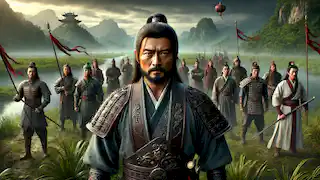
About Story: The Tale of the Water Margin Heroes is a Legend from china set in the Medieval. This Dramatic tale explores themes of Justice and is suitable for Adults. It offers Historical insights. A legendary band of 108 heroes rise against injustice in ancient China.
In the vast and storied history of China, few tales capture the imagination and spirit of rebellion, loyalty, and heroism like the saga of the Water Margin Heroes. Set in the turbulent days of the Song Dynasty, the story of 108 outlaws who stood against corruption, injustice, and tyranny has been immortalized in both legend and literature. The Water Margin, also known as *Outlaws of the Marsh*, is a tale of ragtag bandits who fought not just for themselves but for the downtrodden, embodying the ideals of honor, loyalty, and camaraderie. Song Jiang was a man of both wit and benevolence, known throughout his province for helping those in need. Despite his humble status as a minor official in Yuncheng County, his name became synonymous with justice. However, the system he served was deeply corrupt. His efforts to aid the poor and oppressed inevitably put him at odds with the powerful officials who had no interest in justice but only in their own wealth and influence. One fateful day, Song Jiang was falsely accused of a crime he did not commit. His enemies within the government framed him, and he was forced to flee to avoid execution. As a fugitive, he found himself wandering the margins of society, driven to the marshlands of Liangshan, a place notorious for harboring outlaws. Here, Song Jiang discovered a group of 108 heroes, each with their own tales of injustice and rebellion. United by their common cause, they banded together under Song Jiang’s leadership. They became a force to be reckoned with, a brotherhood that stood for honor, loyalty, and justice. Song Jiang’s charisma and sense of righteousness quickly earned him the respect of the outlaws, who swore their allegiance to him. The marshlands of Liangshan became a refuge for all who sought to escape the injustices of the government. Song Jiang and his band of brothers welcomed everyone, from soldiers and scholars to commoners and warriors. Among them were some of the most skilled and extraordinary individuals in all of China. One of these was Lin Chong, a former instructor of the imperial guards, famed for his martial prowess. Framed by a corrupt official and forced into exile, Lin Chong’s path crossed with Song Jiang’s, and he quickly became one of the key figures in the group. Another was Wu Yong, a brilliant strategist whose mind was as sharp as any sword. Under his guidance, the bandits of Liangshan transformed from a disorganized group of outlaws into a formidable military force. Each member of the brotherhood had a unique skill or talent. Li Kui, known as the Black Whirlwind, was a fierce warrior whose rage in battle was unmatched. Wu Song, the Tiger Slayer, was famous for killing a ferocious tiger with his bare hands, earning him a place among the heroes. Then there was Shi Jin, the Nine-Tattooed Dragon, whose tattoos and strength made him a fearsome opponent. As their numbers grew, so did their reputation. The people of the surrounding regions began to see the heroes of Liangshan as protectors. The corrupt government officials, on the other hand, saw them as a threat. They plotted to bring down the brotherhood by any means necessary. The road to justice was not easy for Song Jiang and his comrades. They fought many battles against government forces sent to crush them. Each skirmish tested their resolve, but it also strengthened their bond. Victory after victory bolstered their ranks, as more people sought refuge with the heroes of Liangshan. One of their most decisive battles came against Gao Qiu, a powerful official who had once wronged Lin Chong. Determined to destroy the brotherhood, Gao Qiu sent a large army to lay siege to Liangshan. But thanks to Wu Yong’s brilliant strategies and the sheer skill of the warriors, the outlaws managed to turn the tide and defeat the imperial forces. However, it was not just external threats that posed a danger to the brotherhood. Internal discord and betrayal also threatened to tear them apart. There were those among the outlaws who had their own ambitions, and jealousy sometimes bred dissent. Song Jiang, though a wise and capable leader, had to navigate the treacherous waters of mistrust within his own ranks. One of the most painful betrayals came from within their own group. Li Kui, though loyal, had a fierce temper that often led him into trouble. His brash actions occasionally endangered their missions, and it took all of Song Jiang’s diplomatic skills to keep the group together. Still, despite the challenges, the brotherhood remained strong. Their sense of justice and their desire to overthrow the corrupt officials who ruled the land united them. Together, they continued their fight, not just for themselves but for all the people of China who suffered under tyranny. As the fame of the Water Margin Heroes spread, even the Emperor himself could not ignore their influence. The imperial court was in chaos, with corrupt officials like Gao Qiu and Cai Jing pulling the strings behind the scenes. The people were restless, and revolts were breaking out across the empire. Desperate to regain control, the Emperor decided to offer the heroes of Liangshan a deal: amnesty in exchange for their loyalty to the throne. Song Jiang, ever the pragmatist, saw an opportunity in the Emperor’s offer. He believed that by accepting the amnesty, the brotherhood could continue their fight for justice within the system rather than as outlaws. But not all of the heroes agreed with this course of action. Some, like Li Kui, believed that the government could never be trusted and that they would only be used as pawns. Nevertheless, Song Jiang’s leadership prevailed, and the group accepted the Emperor’s offer. They were pardoned for their crimes, and in return, they were tasked with defending the empire from foreign invaders and internal rebellions. With their new status as imperial soldiers, the Water Margin Heroes fought valiantly in many battles, always upholding their ideals of justice and honor. However, Song Jiang’s decision to ally with the Emperor would ultimately lead to the brotherhood’s downfall. Though they fought bravely for the empire, they were never fully trusted by the court. Many of the corrupt officials still saw them as a threat, and they plotted to eliminate them once and for all. The heroes of Liangshan found themselves embroiled in a series of brutal campaigns against foreign invaders and rebellious warlords. Though they won many victories, the cost was high. One by one, many of the brotherhood’s key members fell in battle. Wu Song, the Tiger Slayer, was gravely injured during a skirmish and died soon after. Lin Chong, too, met a tragic end after being betrayed by one of his own men. Song Jiang, though devastated by the loss of his comrades, continued to lead the remaining heroes. But he knew that their time was running out. The imperial court, despite having used the brotherhood to fight its enemies, now sought to eliminate them as a potential threat. Song Jiang himself became the target of a deadly conspiracy. In the end, Song Jiang was poisoned by a corrupt official who feared the influence of the heroes. With his death, the brotherhood of Liangshan crumbled. The remaining heroes were either killed or forced into hiding, their legacy fading into legend. Yet, despite their tragic end, the tale of the Water Margin Heroes lives on. They are remembered not for their defeat but for their courage, their sense of justice, and their unwavering loyalty to one another. They stood up against tyranny and corruption, and though they were ultimately betrayed by the very system they sought to change, their spirit continues to inspire. The story of the Water Margin Heroes has endured for centuries, passed down through generations as a symbol of resistance against injustice. Though they were outlaws, their fight was not one of greed or ambition but of righteousness. They stood for the common people, for those who had no voice or power, and they fought against a corrupt system that oppressed the weak and favored the rich. Their tale has been retold in countless forms, from novels and plays to films and television series. Each retelling brings with it a new interpretation, but the core message remains the same: the fight for justice is never in vain, even if it ends in tragedy. The legacy of Song Jiang and his comrades is a reminder that heroism comes in many forms. It is not always found on the battlefield or in acts of great strength, but often in small acts of kindness, in the decision to stand up for what is right, even when the odds are against you. The Water Margin Heroes may have fallen, but their spirit lives on in the hearts of those who continue to fight for justice in a world that is often unjust. Their story is a testament to the power of unity, loyalty, and the indomitable human spirit. The saga of the Water Margin Heroes is one of the most enduring and powerful tales in Chinese history. It speaks to the universal struggle for justice, the bonds of brotherhood, and the sacrifices that must often be made in the fight against oppression. Though their journey ended in tragedy, the Water Margin Heroes left a legacy that continues to inspire those who seek to challenge injustice and defend the powerless. Their story is a reminder that even in the darkest times, there is always hope, as long as there are those willing to stand up for what is right.The Rise of Song Jiang
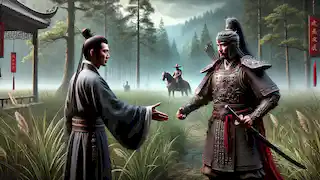
The Band of Brothers
Battles and Betrayals
The Emperor’s Call
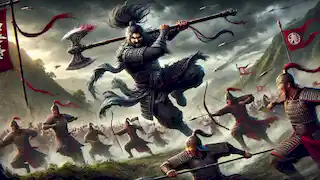
The Fall of Liangshan
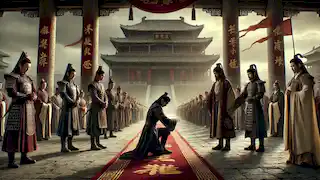
Legacy of the Water Margin
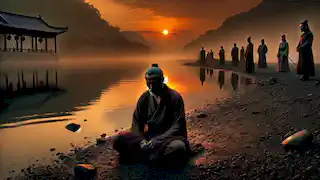
Conclusion

















